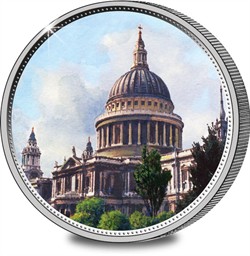-no-button.jpg)
 |
Location: City of London
Date completed: 1675-1720, consecrated 1697, "Topping out"
1708
Designers/builders: Sir Christopher Wren
Function: Church of England Cathedral
|
One of the most inspiring images to come out of World War II is
the photograph of St Paul's Cathedral standing proud and undefeated
amid the flames and smoke of the Blitz. It was a true symbol of the
indomitable spirit of the people of Britain and London. St Paul's
rose from the ashes of another conflagration - the great fire of
London in 1666. This destroyed the old St Paul's begun by the
Normans in 1087 to replace a Saxon cathedral, also destroyed by
fire. In fact, there may also have been a 4th century Roman
cathedral on the site. After the great fire, Sir Christopher Wren
was charged with rebuilding some 50 churches in London and in 1669
was asked to design a replacement for old St Paul's. An initial
proposal was to retain some of the original cathedral, but
ultimately it was entirely demolished and a completely new design
accepted. This was in the English baroque style complete with a
massive dome. Work started in 1675, the cathedral was consecrated
for use in 1697 and the "topping out" was completed on 26th October
1708, although work continued until 1720. When completed it was the
second largest church in England and at 365 ft (111 m) high it was
the tallest building in London until 1962. During World War II it
was a specific target for enemy bombers and was several times
struck by bombs. In October 1940 one destroyed the high altar,
while another in April 1941 fractionally shifted the entire dome.
Another bomb with a time delay fuse struck St Paul's in September
1940 but was defused by a Royal Engineers bomb-disposal squad
before it could explode. Had it exploded it would probably
have destroyed the entire cathedral. An extensive 15-year
restoration project of copper, lead and slate work was completed on
15th June 2011. Today St Paul's is an important part of British
national life. The funerals of Lord Nelson, the Duke of Wellington,
Sir Winston Churchill and Margaret Thatcher were held here.
Charles, Prince of Wales and Lady Diana Spencer were married at its
altar.